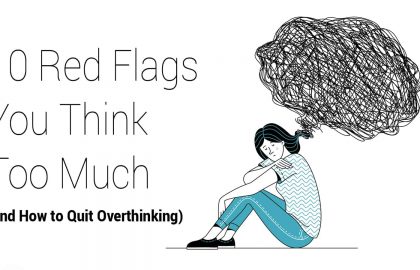One of the best ways to think positive is by reducing the stress in your life. In fact, stress not only impacts our physical health but also clouds our judgment and leads to a negative outlook on life. If you’re not familiar with what positive thinking entails, it is a mental and emotional attitude.
With it, you expect good and favorable results without feeling discouraged when things don’t go quite as planned. For some people, this attitude comes naturally; for others, it is a behavior that must be learned.
To further illustrate this point, some people tend to see the glass as being half-empty while others see it as half-full; positive thinking is all about perspective. In this article, we will discuss how stress and negative self-talk can impede our ability to think positively about the things and people in our lives.
How To Think Positive Always
HOW NEGATIVE SELF-TALK IMPEDES OUR ABILITY TO THINK POSITIVE
Studies have shown many benefits associated with thinking positive, namely in the form of health and general well-being. Also, thinking positive encourages optimism and aids in reducing stress; however, negative self-talk like berating one’s self and being overly self-critical, for example, can have the opposite effect. Struggles and hardships are a natural part of life. We do have some say as to the extent they impact our lives. The best way to overcome the pessimism that comes with life’s challenges is through positive affirmations, commonly referred to as positive self-talk.
HOW SELF-TALK ENCOURAGES YOU TO THINK POSITIVE
The biggest misconception associated with thinking positive is that you’re oblivious to the unpleasant experiences in life. This couldn’t be further from the truth. When you think positive, it doesn’t mean that you only see life through rose-colored glasses. Instead, you approach challenges with a greater degree of optimism. You believe that good things can happen even if your current circumstances say otherwise. Self-talk is an integral part of this process. It can trigger a stream of thoughts, which you can speak aloud or circulate through your consciousness to help distract you from negative experiences, real or perceived.
THINK POSITIVE TO IMPROVE YOUR HEALTH
Studies consistently prove the correlation between our thoughts and our overall health. To that point, thinking positive has been shown to provide the following health benefits:
- Reduced feelings of anxiety and depression
- Reduced stress
- An increase in life expectancy
- Resistance to common colds
- Improved cardiovascular health
- Improved capacity to cope with hardships
Of course, this is not a comprehensive list. Ongoing research continues to explore additional health benefits that may link to positive thinking. It is also worth noting that more research is needed to identify why thinking positive provides so many health benefits. Early studies, however, have shown that positive thinking can help reduce stress, which, coincidentally, causes a variety of health problems. That said, it stands to reason that the body would respond favorably as stress levels decline. Also, individuals who think positively tend to lead healthier lifestyles than those who are negative and pessimistic, which further reduces stress levels.
NEGATIVE THINKING
While positive self-talk can be uplifting, negative self-talk can increase stress levels and adversely affect one’s outlook. That said, it is important to distinguish between these two very different ways of thinking; naturally, they impact our lives in either a negative or positive way. Now that we have a general understanding of what positive self-talk entails, let’s take a moment to explore the impact that negative self-talk can have on our lives. Individuals who engage in negative self-talk tend to exhibit the same patterns of behavior including:
- Personalizing – When bad things occur, negative thinking individuals tend to blame themselves even if they had no say in how things may have unfolded. Needless to say, this way of thinking is the antithesis of thinking positive.
- Polarizing – Individuals who engage in negative thinking usually only see things as good or bad, leaving no room for middle ground. This all-or-nothing mentality leaves them feeling either defeated or like they’re on top of the world.
- Filtering – This perspective is akin to “blowing things out of proportion.” Negative thinking individuals will often magnify the negatives in a given situation while disregarding the positives.
- Catastrophizing – This mentality is characterized by irrational thoughts whereby negative-minded individuals always anticipate the worse possible outcome in any situation.
Negative thinking and negative self-talk can lead to a number of emotional and physical health problems. Of course, changing the way you think is not always easy; however, breaking these habits can significantly improve your overall quality of life.
WHAT HAPPENS WHEN YOU THINK POSITIVE?
Let’s take a moment to explore positivity thinking and positive self-talk. Individuals who engage in positive self-talk tend to possess the following qualities:
- Identify opportunities for improvement – Individuals who engage in positive thinking and self-talk are more inclined to view negative experiences as an opportunity to make improvements, which is much more productive. You can apply this type of thinking to any area of life, including work, relationships with friends and family, and personal development.
- Self-assessment – Positive individuals are more likely to take inventory of their lives. This gives them an opportunity to reevaluate things in their lives and make changes as needed. Self-assessments can also help put things in perspective, enabling you to see the positives in situations that may otherwise be unpleasant.
- A sense of humor – Positive-minded individuals are more likely to laugh or smile, even in challenging situations. They are not as likely to allow negative experiences to cause them stress, which could potentially lead to health and emotional problems.
- Positive self-talk – Individuals who are positive will often engage in encouraging self-talk. Also, they are more inclined to use this practice as a means of evaluating and ultimately dismissing negative thoughts and experiences.
- Healthy lifestyle – Those who are positive are more likely to lead a healthy lifestyle, typically consuming a healthy diet and exercising regularly. That said, positive-minded individuals tend to be more conscious of the relationship between physical and mental health.
- Surround themselves with like-minded people – Positive people typically remain positive by surrounding themselves with other positive people who tend to be more encouraging and supportive. Conversely, surrounding one’s self with negative people can cause stress and other problems.
HOW TO COPE WITH STRESS AND THINK POSITIVE
Because stress can impede our ability to think positive, it is a good idea to manage the stress in our lives. In doing so, however, it helps to identify the sources of stress in your life first. According to the American Psychological Association, most people tend to stress about their relationships, careers, personal health, and the economy. It is also worth noting that there is a significant disparity when it comes to the stress levels among minorities compared to that of Caucasians. Regardless of your ethnic background or the source of your stress, there are ways to get your stress levels under control including:
Understanding how you respond to stress
Everyone responds to stress differently. Some people may not be triggered by certain stressful situations while others may become unraveled by them. Identifying what causes stress in your life can make coping with it that much easier.
Stress and coping mechanisms
Much like stress impacts everyone different, coping mechanisms can vary from person to person. It is important to find one that works for you. That said, many people find going to the gym, meditating, and exercising effective when it comes to relieving stress.
Seeking help
Many of us like to be self-sufficient. However, sometimes resolving the stress in your life requires that you reach out to friends and family for support. In most cases, friends and family are very sympathetic. They will likely be willing to do whatever is necessary to help you resolve the stress in your life.
In summary, the best way to think positive is to minimize the stress in your life and to surround yourself with positive people. The benefits that come with thinking positively can complement your life in a variety of ways, from improved mental clarity to better overall health. If you’re ready to embrace positivity and the many benefits that come with it, you’re encouraged to follow some of the advice outlined in this article.
The post How To Always Think Positive By Using This Mental Trick appeared first on Power of Positivity: Positive Thinking & Attitude.
Source – powerofpositivity.com






